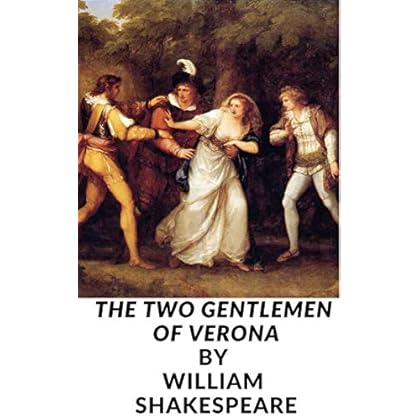The Two Gentlemen of Verona by William Shakespeare
Category: Kindle Store,Kindle eBooks,Literature & Fiction
The Two Gentlemen of Verona by William Shakespeare Details
he Two Gentlemen of Verona is a comedy by William Shakespeare, believed to have been written between 1589 and 1593. It is considered by some to be Shakespeare's first play,[a] and is often seen as showing his first tentative steps in laying out some of the themes and motifs with which he would later deal in more detail; for example, it is the first of his plays in which a heroine dresses as a boy. The play deals with the themes of friendship and infidelity, the conflict between friendship and love, and the foolish behaviour of people in love. The highlight of the play is considered by some to be Launce, the clownish servant of Proteus, and his dog Crab, to whom "the most scene-stealing non-speaking role in the canon" has been attributed.Two Gentlemen is often regarded as one of Shakespeare's weakest plays. It has the smallest named cast of any play by Shakespeare.

Reviews
This was one of Shakespeare's plays that never enjoyed much popularity. Many of you will probably recall this as the 'not so good' play in "Shakespeare In Love" that did not go so well. (Undoubtedly, this movie brought some popularity to this not overly popular play.)I'll grant that this comedy of Shakespeare's is not exactly on par with "Comedy of Errors," "Midsummer Night's Dream," or "Merchant of Venice." We must remember though that no matter how good any writer is, NOT EVERY SINGLE PIECE OF WORK THEY PRODUCE CAN BE A MASTERPIECE. And there are some things that make "The Two Gentleman of Verona" a significant step in Shakespeare's writing career.The play revolves around the conflicts between romantic love and friendship. (A worthy subject) We meet the 2 characters Valentine and Proteus. They appear to be good friends. Valentine wants to travel. We also learn that Proteus has an affection for Julia. Later in the 1st act, Antonio (Proteus's father) wants to send him away to see the world. Of course, Proteus is sad about leaving his love interest Julia, but like a good son, he does not go against his father.By the 2nd Act, we learn that Valentine has gone into the service of the Duke of Milan. He has also shown a love interest in the Duke's daughter Silvia. (Though there is a problem. Silvia's father wants her to marry Thurio.) As displayed in "Shakespeare In Love," there is the comical scene with Launce and his dog. He's mad at the dog for not sharing his grief of leaving. (Perhaps the dog should have been more sensitive.)Soon afterwards, Proteus and Valentine are reunited, but the theme of the story kicks in as Proteus starts to find Silvia attractive. Just as Julia decides to cast Julia off and risk losing the friendship of Valentine, Julia decides to visit Proteus. (A little suspense is always welcome in comedy.) This is the 1st female character of Shakespeare's to pass herself off as a man.Playing the devil, Proteus tells Silvia's father of Valentine's feelings for Silvia. (He tells the truth, but neglects to mention his ulterior motives!) This causes the Duke to banish Valentine. The banished Valentine the runs across some outlaws and befriends them.Later, we have elements that foreshadow "12th Night." Julia (disguised as a man) takes an office of servant to her love interest (Proteus), and she finds herself wooing Silvia on Proteus's behalf. In an interesting scene Silvia (not knowing that she is talking to Julia) expresses her sympathy for Julia, and Julia slips into a comical jealous rage.Well, Silvia runs off to join Valentine, but falls into the hands of the outlaws. Proteus rescues her, but wants too much of a reward. But Valentine prevents the possible rape. There are some who feel that the reconciliation between Proteus, Silvia, Valentine, Julia (not to mention the Duke pardoning the outlaws) was too unreal. And it does happen a bit fast. But remember, this is a comedy, and there is a limitation to what an audience will sit through. An incomplete reconciliation here would hamper the joy Shakespeare needs for the end of the comedy.While this is not Shakespeare's best, it still has some worthwhile elements. At least give it a chance.


